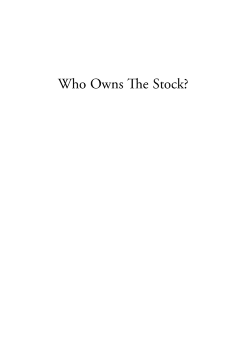
Additional Information
Book Details
Abstract
The issue of collective and multiple property rights in animals, such as cattle, camels or reindeers, among pastoralists has never been a subject of special cross-cultural and comparative study. Focusing on pastoralist societies in East and West Africa, the Far North and Siberia, and the Eurasian steppes, this volume addresses the issue of property rights and the changes these societies have undergone due to the direct or indirect influence of modernization and globalization processes. The contributors also investigate the interplay of older sets of rights and modern marketing policies; political, ecological and economic effects of collectivization and de-collectivization; the existence of collective and private property in the Soviet Union and its successor states; state taxation and destocking measures in African dry lands; and the effects of quarantine, as well as import and export regulations. The rich and well-researched ethnographic, historical, and economic data in these chapters provides new theoretical insights into the matter of property rights in animals.
Günther Schlee is Director at the Max Planck Institute for Social Anthropology in Halle. Until 1999, he was a Professor for Social Anthropology at the University of Bielefeld. His publications include Identities on the Move: Clanship and Pastoralism in Northern Kenya (Manchester University Press 1989).
Anatoly M. Khazanov is Ernest Gellner Professor of Anthropology (Emeritus) at the University of Wisconsin-Madison. His publications include Nomads and the Outside World (1st. ed. Cambridge University Press, 1984) and After the USSR: Ethnicity, Nationalism, and Politics in the Comonwealth of Independent States (University of Wisconsin Press, 1995).
“…theoretical diversity around a common subject is the defining strength of the book. The wide range of intellectual interests, from Ingold’s sentient ecology to New Institutional Economics, makes the bibliography a goldmine for graduate students and others seeking to expand their theoretical horizons. The book is an important contribution to economic anthropology, pastoral studies, and legal pluralism. It belongs in every well-stocked institutional library and will doubtlessly be a reference for years to come.” · The Journal of Legal Pluralism and Unofficial Law
“…on the whole this volume offers a rich and insightful look into the lives of people whose notions of property can complicate overly simplistic assertions of the naturalness or inevitability of private property regimes that often serve the interests of the globally powerful. At the same time, it challenges perspectives that would deny the growing import and relevance of access to markets and to just allocation of property for individuals across cultures and places. In this regard, I wholeheartedly recommend it to both specialist and general readers with an interest in the politics, economics and ecologies of property, private and otherwise.” · The Toronto Review of Books
“This volume offers a rich and insightful look into the lives of people whose notions of property can complicate overly simplistic assertions of the naturalness or inevitability of private property regimes that often serve the interests of the globally powerful. At the same time, it challenges perspectives that would deny the growing import and relevance of access to markets and to just allocation of property for individuals across cultures and places. In this regard, I wholeheartedly recommend this book to both specialist and general readers with an interest in the politics, economics and ecologies of property, private and otherwise.” · The Toronto Review of Books
